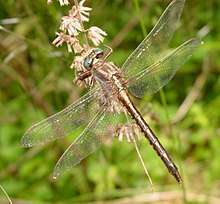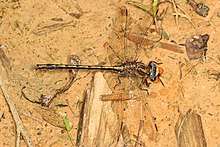Phanogomphus
Phanogomphus is a genus of clubtails in the family Gomphidae found in North America. There are about 17 described species in Phanogomphus.[1][2][3]
| Phanogomphus | |
|---|---|
 | |
| Phanogomphus lividus | |
| Scientific classification | |
| Kingdom: | Animalia |
| Phylum: | Arthropoda |
| Class: | Insecta |
| Order: | Odonata |
| Infraorder: | Anisoptera |
| Family: | Gomphidae |
| Genus: | Phanogomphus Carle, 1986 |

Phanogomphus oklahomensis
Phanogomphus was formerly considered a subgenus of Gomphus, but has recently been promoted to genus rank along with Stenogomphurus, Gomphurus and Hylogomphus.[4]
Species
These 17 species are members of the genus Phanogomphus.[4][5][2]
- Phanogomphus australis (Needham, 1897) (clearlake clubtail)
- Phanogomphus borealis (Needham, 1901) (beaverpond clubtail)
- Phanogomphus cavillaris (Needham, 1902) (sandhill clubtail)
- Phanogomphus descriptus (Banks, 1896) (harpoon clubtail)
- Phanogomphus diminutus (Needham, 1950) (diminutive clubtail)
- Phanogomphus exilis (Selys, 1854) (lancet clubtail)
- Phanogomphus graslinellus (Walsh, 1862) (pronghorn clubtail)
- Phanogomphus hodgesi (Needham, 1950) (Hodges' clubtail)
- Phanogomphus kurilis (Hagen in Selys, 1858) (Pacific clubtail)
- Phanogomphus lividus (Selys, 1854) (ashy clubtail)
- Phanogomphus militaris (Hagen in Selys, 1858) (sulphur-tipped clubtail)
- Phanogomphus minutus (Rambur, 1842) (cypress clubtail)
- Phanogomphus oklahomensis (Pritchard, 1935) (Oklahoma clubtail)
- Phanogomphus quadricolor (Walsh, 1863) (rapids clubtail)
- Phanogomphus sandrius (Tennessen, 1983) (Tennessee clubtail)
- Phanogomphus spicatus (Hagen in Selys, 1854) (dusky clubtail)
- Phanogomphus westfalli (Carle & May, 1987) (Westfall's clubtail)
gollark: How could you be bothered to implement CSS in it anyway?
gollark: Plus everyone's custom solutions.
gollark: This is madness. How many shops are there?
gollark: 1 googolplex = 1^googol.
gollark: 1 googol = 1^100.
References
- "Phanogomphus Genus Information". BugGuide.net. Retrieved 3 February 2018.
- "Odonata Central". Odonata Central, University of Alabama. Retrieved 3 February 2018.
- Ball-Damerow, J.E.; Oboyski, P.T.; Resh, V.H. (2015). "California dragonfly and damselfly (Odonata) database: temporal and spatial distribution of species records collected over the past century". ZooKeys. 482: 67–89.
- Ware, Jessica L.; Pilgrim2, Erik; May, Michael L.; Donnelly, Thomas W.; Tennessen, Kenneth (2017). "Phylogenetic relationships of North American Gomphidae and their close relatives". Systematic Entomology. 42 (2): 347–358.
- "World Odonata List". Slater Museum of Natural History, University of Puget Sound. Retrieved 18 August 2018.
Further reading
- Ross H. Arnett (30 July 2000). American Insects: A Handbook of the Insects of America North of Mexico. CRC Press. ISBN 978-0-8493-0212-1.
This article is issued from Wikipedia. The text is licensed under Creative Commons - Attribution - Sharealike. Additional terms may apply for the media files.